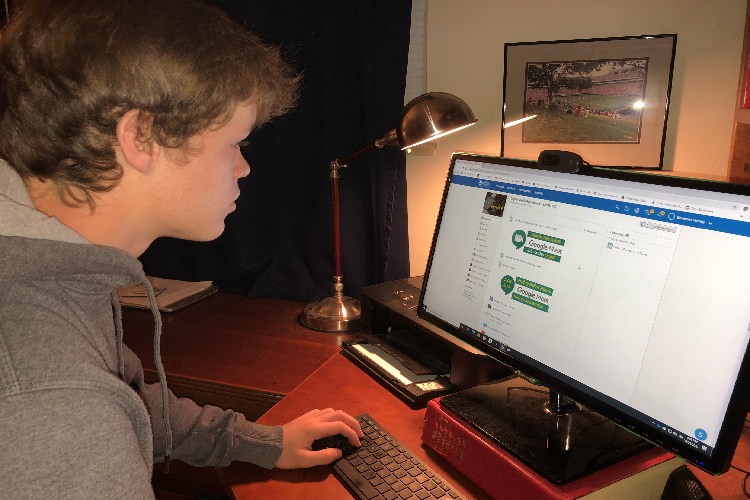
9th grader Benjamin Hartley studies in his at-home "classroom." photo by Georgia Hartley
The class of 2024 is experiencing a very different beginning to their high school career.
The beginning of high school is an exciting yet intimidating time for any freshman. They are surrounded by new peers, new teachers, and a new environment. The expectations put on them are likely different than any that they have experienced before. Typically, many of these students enter high school having an idea of what to expect. Whether from an older friend or sibling, TV shows and movies, or discussions in middle school classrooms, there is often a general understanding of what the next four years of students’ lives will consist of: football games, spirit weeks, school dances, a lot of homework, some challenging classes, and a ton of new faces. There is a level of certainty that comes with the high school experience that many freshmen expect. This level of certainty flew out the window for the 2020-2021 school year. For the class of 2024, there could be no expectations and understanding for the beginning of their freshman year. Everything was, and remains, up in the air.
For freshmen in the Denver Public School District, the only known variable was that they would be starting their school year from the comfort of their own home. As schools geared up to return, DPS made the decision to keep their students learning remotely in an effort to prioritize the health and safety of their students, staff, and families. While this decision was made in the best interest of the community, it has not been easy on the students or teachers, especially the freshmen. Not only are they adjusting to high school, but they are adjusting to learning remotely, something that comes with a host of struggles. Lily Mullins, a freshman at TJ, stated that she finds it extremely difficult “to focus all day while sitting and looking at a screen for six hours.” She explained that each day of virtual learning leaves her exhausted. After hours of classes on their computers, students are also struggling to find the motivation to work on their homework and submit assignments. Because of this, maintaining good grades has become even harder and more stressful. For many students, high school is the first time that their grades must become their priority. High school teachers generally have higher expectations than middle school teachers, as it is their job to prepare their students for college starting as early as their freshman year. Regarding grades, remote learning threw a curveball at many freshmen, including Saben Snyder, who recalled that his grades “were bad at the start of the year,” but explained that he has “adapted to online learning and has raised [his] grades.” Snyder is not alone in this struggle. Many students across all years of school have shared in this experience with him. Beyond boredom, lack of motivation, and grades, starting out freshman year virtually has taken a serious toll on the mental health of many students. Freshman Benjamin Hartley reported that he has struggled with “finding a way to be engaged and happy during [his] online school.” Many students are not as happy doing school from their homes.
This decline in mental wellness of students, especially freshman, can likely be attributed to the lack of human contact that children are experiencing. They are missing out on the high school experience, which is largely social. The class of 2024 is not able to attend their first volleyball game and experience the school spirit the upperclassmen have in the student section. They are missing getting ready with their friends for their first homecoming dance. Most importantly, they are losing the opportunity to meet the new people who will impact their lives drastically over the next four years: their teachers and their peers. Mullins, Snyder, and Hartley unanimously agreed that they do not feel very connected to their teachers or their peers. “The teachers are mostly just seeing students’ icons and not their real faces,” claimed Mullins. Because of this, the students are missing out on gaining that emotional connection that forms from observing faces and listening to peers speak. Overall, the students do not feel like they are truly a part of the TJ community. “I feel a part of my class communities, but I don’t feel any connection to the TJ community yet,” stated Hartley. He, as well as Snyder and Mullins, are hopeful that this connection will flourish when they are able to be in the school for classes and events.
Even in this trying time, there are still some silver linings for these freshmen. Hartley says that online school has taught him a lot about being organized and managing his time, skills that will transition well into in-person learning and the rest of his life. In general, many of these new high schoolers are being taught a very valuable lesson: they are learning to adjust to change and hardship and to make the best of hard situations.